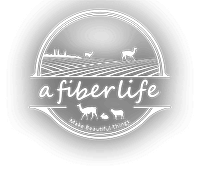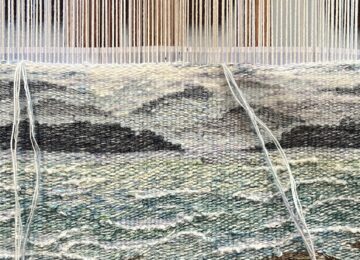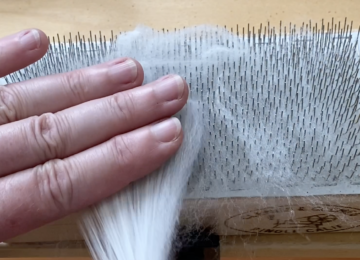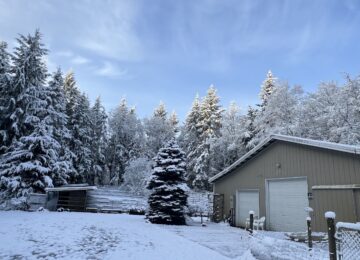I think of it like this:
Every couple needs a “we” or a third thing—a focal point that exists not solely within one individual but rather something shared between them. Something cherished mutually, binding them together. I remember reading an article called “The Third Thing” by the American poet Donald Hall, which left a lasting impression. Hall and his wife Jane Kenyon, also a poet, moved to a rustic farm in Vermont with a pond. The pond magnetized them and created a unit of belonging. It, and the poetry they wrote there, became their third thing. He described how, rather than staring into each other’s eyes, their gazes met and entwined as they looked at the water. From that article, I have always held the idea that the third thing for a couple is essential. It is not an adornment, it is not icing on the cake, it is a central form of companionship. A practice of double attention. The third thing doesn’t have to be anything extraordinary, but it does need to be there. When a couple discovers their third thing, it’s akin to finding a shared vision that will fortify their bond and endure over time.
This episode is a love story. Not just the kind where two people find each other and fall madly in love. There’s a deeper layer to it, intricately woven with the significance of a particular place. And more specifically, it’s a narrative that casts trees as central characters. It’s about our search for a third thing, all the things we tried, and in the end it reveals the essence of our newly found third thing and why that holds such profound significance.
“Yeah, I think the children were a third thing. For much of our time together,” Greg said. “We shared this profound commitment to them.”
“Yeah, and I’ve been thinking about us being such different people with such different interests,” Lisa said.
I used to be a pretty compulsive problem solver. Encounter an issue, and I would immediately set out to fix it. The fact that Greg and I are inherently different individuals wasn’t a problem in itself. However, the challenges we faced in finding a new third thing kept coming up as a recurring concern for me. So, driven by my determination, and with Greg’s participation, we embarked on a series of endeavors in search of this elusive “third thing.” Some of these attempts proved to be dismal failures, while others may still hold potential. But, amidst our trials, we came to an important realization—we have spent a considerable amount of time working to identify an alternative “we” beyond our roles as parents.
“So what do you remember that we tried? That could potentially have been a third thing?” Lisa asked.
“What do I remember that we tried? Let’s see. Baseball,” Greg said. “You don’t like baseball.”
“Well, I don’t like it the way you love it,” Lisa said.
“Alright. The thing about a third thing, it seems to me is, if we have one is it has to be 5050? or pretty close to that it has to pull the same heartstrings in each of us,” Greg said.
“Yes,” Lisa replied.
“And that’s difficult, because we have different ways of looking at the world and different things we like and yeah, all of that. It’s difficult,” Greg said.
“Well, We did we had lofty dreams about sailing,” Lisa said.
“Yeah. Well, that didn’t work out too much,” Greg said.
“We tried to sail. And I was like nine months pregnant,” Lisa said.
“Yeah, that’s why it didn’t work out,” Greg laughed.
“And we kept tipping over and I couldn’t get my huge body back up in that little boat,” Lisa said.
“Right. Yeah, that was not a good time to try sailing. We may have to try it again,” Greg said.
“Sailing wasn’t so good. And then what else? Dancing,” Lisa said.
“Dancing. Yeah,” Greg said.
“Salsa dancing,” Lisa said.
“Right. I mean, you just don’t have a feel for the rhythm. I don’t know what else to say,” Greg said.
“It’s not 50/50 on that one,” Lisa said.
“What else did we have? I mean, certainly all the things you do with fiber are your thing,” Greg said.
“You don’t love it,” Lisa said.
“Oh, I tried to help you wash the wool. What do you call that?” Greg asked.
“Scour?” Lisa said.
“Scour the wool. There we go. Yeah, I tried to do help with that,” Greg said.
“Yeah, you were good at it. But I don’t think you loved it,” Lisa said.
“No. No. I was doing it for you,” Greg said.
“It was like my thing that you were contributing to,” Lisa said.
“I wanted to be helpful,” Greg said.
“Okay. What else? I was thinking about some couples we know. Like, they go to the gym together. And that’s their third thing, right?” Lisa said.
“You never liked the gym,” Greg said.
“I hate the gym and neither of us go so,” Lisa said.
“Right,” Greg said.
“And then you know what else?” Lisa said.
“I don’t what else? Greg said.
“Oh, open water swimming,” Lisa said.
“Open water swimming. That’s your thing. I like it. But I’m not……”Greg faded off
“Yeah, and I’m kind of cool on it,” Lisa said.
“Oh, clamming,” Greg said.
“Clamming. Oh my god. It was too much sand,” Lisa said.
“And you didn’t like the results of clamming,” Greg said.
“NOOO. Why do you scoop up sand to eat for dinner?” Lisa said.
“Yes. Okay. That wasn’t a third thing,” Greg said.
“And even crabbing, is a once a year third thing that we actually enjoy when we do it,” Lisa said.
“We would enjoy it more if we had a little boat,” Greg said.
“Yeah, that could that we could put that on the Maybe,” Lisa said.
“On the maybe list?” Greg said.
“Yeah,” Lisa said.
“We got to try it list,” Greg said.
Remember how Season 3 of this podcast is centered on capturing ordinary moments? I’ve been diligently working on that. It’s required a shift in focus because capturing ordinary moments is really different from searching, problem-solving, or striving.
It’s about being fully present and attuned to the world. So, while we were having that conversation, in our beautiful back pasture, standing in the very spot where we first set foot on this property—both of us struck by the vastness of the land and the abundance of forest—we took a moment to soak in our surroundings. With 360-degrees of towering trees enveloping us, Greg began telling me about them.
“I learned something today. That alders fix nitrogen in the soil,” Greg said.
“Do they really?” Lisa said.
“So Fir trees like to grow next to Alders because the Alders fix the nitrogen which feeds the Fir trees,” Greg said.
“They help each other out?” Lisa asked.
“Yeah,” Greg said.
“Interesting, does a Fir tree do anything for the Alder do you think?” Lisa asked.
“I don’t know. Probably keeps the wind off of it,” Greg said.
“So is that one where there’s an Alder,” Lisa said.
“and two Fir trees next to it? Yes,” Greg said.
“So there. That’s a little family,” Lisa said.
“Yes, that’s right,” Greg said.
Greg is a wealth of information. He collects trivia about esoteric things like I collect yarn and fiber. He’s got a stash of knowledge and trivia that is bigger than he can use up in one lifetime. Much of his information is centered around his passions, ancient religion, history, baseball, politics. Which are all so NOT my interest. And it’s difficult for me not to glaze over when he starts imparting his knowledge. I’m not very good at faking interest, and after 33 years of marriage, I don’t.
But, in my quest to capture ordinary moments, I’ve discovered something remarkable: when Greg speaks of trees, I want to listen. There’s a shared reverence between us, a mutual fascination with the majesty of nature’s giants.
This brings us back to the moment Lisa asks Greg about whether or not he wants to go into the forest.
“Yeah,” Greg said.
.
“Okay,” Lisa said.
Just outside the pasture fencing, our forest begins. It is thick with trees and bramble. So dense that sun can’t touch the needle laden floor. It was one of those ordinary evenings when we decided to go into the forest and hang out with the dampness and be among the trees.
Walking, sticks crackling
“So you know, we’re back here in the middle of the forest. And it’s so overgrown, because it was over planted for logging. The trees are not healthy, they are green only at the very top, like the very top 20% are green, even this big one right here in front of us. That one, it must be 18 to 20 inches in diameter, that’s a pretty good-sized tree, right And if you look at it, it’s green on one side. But the branches are 50 feet up when they start, and doesn’t have a crown until about 80 feet, 70 feet off the ground, right?’ Greg said.
“Like that one on the edge of the forest is green all the way around—it’s healthy? It’s not all crowded inside here,” Lisa said.
“Right,” Greg said.
“And there’s another healthy one?,” Lisa asked.
“Right. And the sad thing is, they will never grow. They will not sprout green limbs where they’ve already died from the trunk,” Greg said.
“Okay,” Lisa said.
“From closer to the ground. They will not do that when you cut down the trees around them. What they will do is get bigger and grow higher. And then they will always have the same height of green limbs, but the tree will be so much taller that green limbs will cover 50% of the tree instead of 20%. If that makes sense,” Greg said.
“But is that okay? Or is that fall down?” Lisa asked.
“Oh, that will be a mature healthy forest,” Greg said.
As I listened to Greg, the realization grew in me: we both hold a deep love for these trees. It brought back a memory of a particularly magical sunrise awhile ago. That day, if a drone had been hovering above us, we might have seemed like tourists, clumsily attempting to capture panoramic views with our phones. There we were, standing in the driveway, stopped in our tracks on our usual morning routine of feeding and cleaning up after the animals. Our gazes fixed upward, captivated by the towering trees and the colors in the sky behind them . That moment etched itself into my memory, a shared experience I will always cherish with Greg.
“So the other day when we went outside, and there was that spectacular sunrise,” Lisa said.
“Yes,” Greg said.
“I mean, we get them. But that one in particular, somehow was so pink. It was memorable to me,” Lisa said.
“Right,” Greg said.
And sometimes I feel like the trees are actual, like, witnesses with us. You and I were both going around in a circle,” Lisa said.
Right,” Greg said.
“Looking at the color in the sky,” Lisa said.
“And looking at it bouncing off the trees without any leaves on them,” Greg said.
“That’s right. The alders were glowing pink,” Lisa said.
“Right,” Greg said.
“And looking in any direction. Even to the sky. We have these glorious trees, you know, silhouetted against this pink. And literally pointing, you know, like,”look, look all around us”, you know?” Lisa asked.
That started us on a roll with our newly found appreciation for trees and our eagerness to remember ordinary moments spent among them.
“And the Evergreens are wonderful too, although I have to say they’re not my favorites. But there’s tons of them. And they’re very big. And they’re very graceful looking. And powerful looking. But I think my favorites are the big leaf maples. Because in the fall when the wind blows, the leaves turn this bright gold. They’re not yellow, and they’re not brown. They turn this bright gold colored,” Greg said.
“Glowing,” Lisa said.
“Yeah. And when the wind blows in the Fall, you can be standing underneath them in this cloud of descending golden orbs. I mean, 1000s of them all headed for the ground,” Greg said.
“Yeah,” Lisa said.
“And I always tell myself this stupid joke. I say it’s golden showers, which in the Pacific Northwest means standing under maple trees rather than the other meaning. I don’t know if I can say that on the podcast, but that’s always the stupid joke that goes through my mind,” Greg laughed.
There was another moment, seemingly ordinary yet profoundly significant, that for me, solidified the importance of trees and our shared connection with them. It happened when Georgia, our alpha guanaco, succumbed to cancer. Now, I understand if you don’t immediately see this as an ordinary moment–after all, ending our beloved guanaco’s suffering isn’t an everyday occurrence. However, here on the farm, death is a reality we must face. Just like trees falling on fences or animals battling parasites, it’s a part of farm life.
I wrote about my experience in the notebook I’ve started keeping ever since we’ve started collecting our ordinary moments for this season on the podcast. I begin every entry with “I want to remember.”
Here goes:
I want to remember how the trees stood as solid witnesses. Sentries guarding me against floating or melting or shattering into a million pieces.
The vet had managed to get her needle of Xylizine into Georgia and now we were waiting for it to take effect. Greg held the lead as his beloved beast circled him. Afraid of the handling, she wanted to escape, but she was too weak from her cancer to fight it. At one point Greg told Georgia to lean her head against his shoulder. My heart hurt. And that was when I looked to the trees.
We were in the back pasture on a flat area in front of the grave Greg had dug before the snow came. There, the firs are massive and straight. Their arrow tops point sharply to the sky. Knives lined up in a silverware drawer.
Once I noticed them, I couldn’t help but feel their presence enveloping us.
The drug taking affect, Georgia went down to the ground, splayed out like no self-respecting guanaco would let herself be seen. Her head heavy, her eyes vacant.
I reached for Greg’s hand, feeling the weight of his grief mirrored in my own. He was still clutching the purple lead rope. I gently took it from him and let it fall to the ground. Georgia wasn’t going anywhere now. And neither were we. With a silent squeeze of his hand, I found solace in the unyielding support of the trees, standing tall and steady around us.
The trees (and the ground they grow in, and even the life we live among them) are indeed our new third thing. I asked Greg what he thought the trees gave our relationship. As our new third thing, what did they provide?
“Well, I? I don’t know. I mean, I guess I’m going to ask you the same thing. After I say that what popped into my mind, I think there is a majestic connection to the earth. It’s a majestic growing connection to a growing Earth,” Greg said. “Well, I think I think it just pulls us, pulls me in, pulls us in to caring for this ranch, this farm this earth. You can probably say it better,” Greg said.
“I think for me, you know, you can’t get any more grounded really than a tree,” Lisa said.
“Right,” Greg said.
“So I think living with them, and sort of being surrounded by them–and then also you know, the ongoing upkeep, trimming and fertilizing and managing the forest and all of that. It’s like we’re caretaking the groundedness of it all, you know? Or we’re interacting with it, we automatically have contact with it,” Greg said. And so your feeling is that what they represent, keeps us sort of grounded in the present?
“Yeah, I think so. There’s a solidity. Like even in a storm for the most part a tree remains solid,” Lisa said.
“Well, they’ve all grown up with one another. So they help one another,” Greg said.
“They rely on one another and so you know there’s is a constant about them. There’s a continuity, there’s a solidity. And I think by living amongst them together and having them be a big part of the third thing that that’s come in to our relationship,” Lisa said.
“I think that might be true. I think that is true that our relationship has become more grounded for lack of a better word. Do you think it’s just osmosis, we’ve sucked it up off the trees? We’ve inherited it, it’s just sort of infused us from the trees,” Greg said.
However it happened. Whether by osmosis or inheritance, our third thing– the trees and the land on which they grow– has ushered in a new feeling for us. It used to be, with the kids and the whiteboard, the essence of our third thing gave us complexity and management and excitement. Now with the forest and the glowing pink alders, our third thing brings rootedness and strength.
“Well, yeah. But in the end, I think it’s true. We both love this place,” Lisa said.
“And our lives here. And one another,” Greg said.
“and one another here,” Lisa said.
“Yes. Yeah. I do love you here more than I loved you in suburbia. I don’t know what changed. But I do. Maybe it’s just because I’m quieter and slower,” Greg said.
“I think that’s it’s such a good point. The third thing also needs to nurture the people,” Lisa said.
“Right,” Greg said.
“I feel like I’m a better version of myself here. And so I’m glad you love me better you know? Lisa said.
“Yeah,” Greg responded.
“Should we walk back?” Lisa asked.
There you have it—a love story, not just about the two of us, but about the trees and our lives among them. See the third thing is not something you can conjure up with a snap of your fingers or get by just signing up for a class. But it can be cultivated by paying attention to the everyday moments. It could be anything—cooking together, taking walks, or even sharing a love for a particular hobby.
But I can tell you, once you identify your “third thing” and declare it as such, something magical happens. It becomes a focal point, a shared passion that strengthens your bond. The essence of this “third thing” lies in the connection it fosters—it’s a space where you both feel understood, supported, and genuinely engaged.
It makes you both better versions of yourselves, enriching your relationship with depth, meaning, and fulfillment. In the end, your third thing joins you as a central character in your own love story. And that’s a beautiful thing.









